Employee Benefits Debate: Entitlement, Productivity, and Retention
VerifiedAdded on 2022/10/14
|6
|1504
|123
Essay
AI Summary
This essay presents a well-structured argument against the idea that employee benefits should be considered entitlements. The author contends that benefits like bonuses, insurance, and pension schemes, while valuable, should not be viewed as rights. The essay supports its stance by arguing that entitlements do not guarantee job satisfaction, improved productivity, or employee retention, and they don't necessarily enhance an organization's image. The author provides detailed reasoning, citing multiple sources to support the claims, and concludes that while rewarding employees is crucial, making benefits an entitlement can be costly and impractical for the employer. The essay is well-researched and clearly articulates the author's position on this important issue.

1
Employee benefits should never be considered entitlements
Name
Professor
Course
Date
Employee benefits should never be considered entitlements
Name
Professor
Course
Date
Paraphrase This Document
Need a fresh take? Get an instant paraphrase of this document with our AI Paraphraser
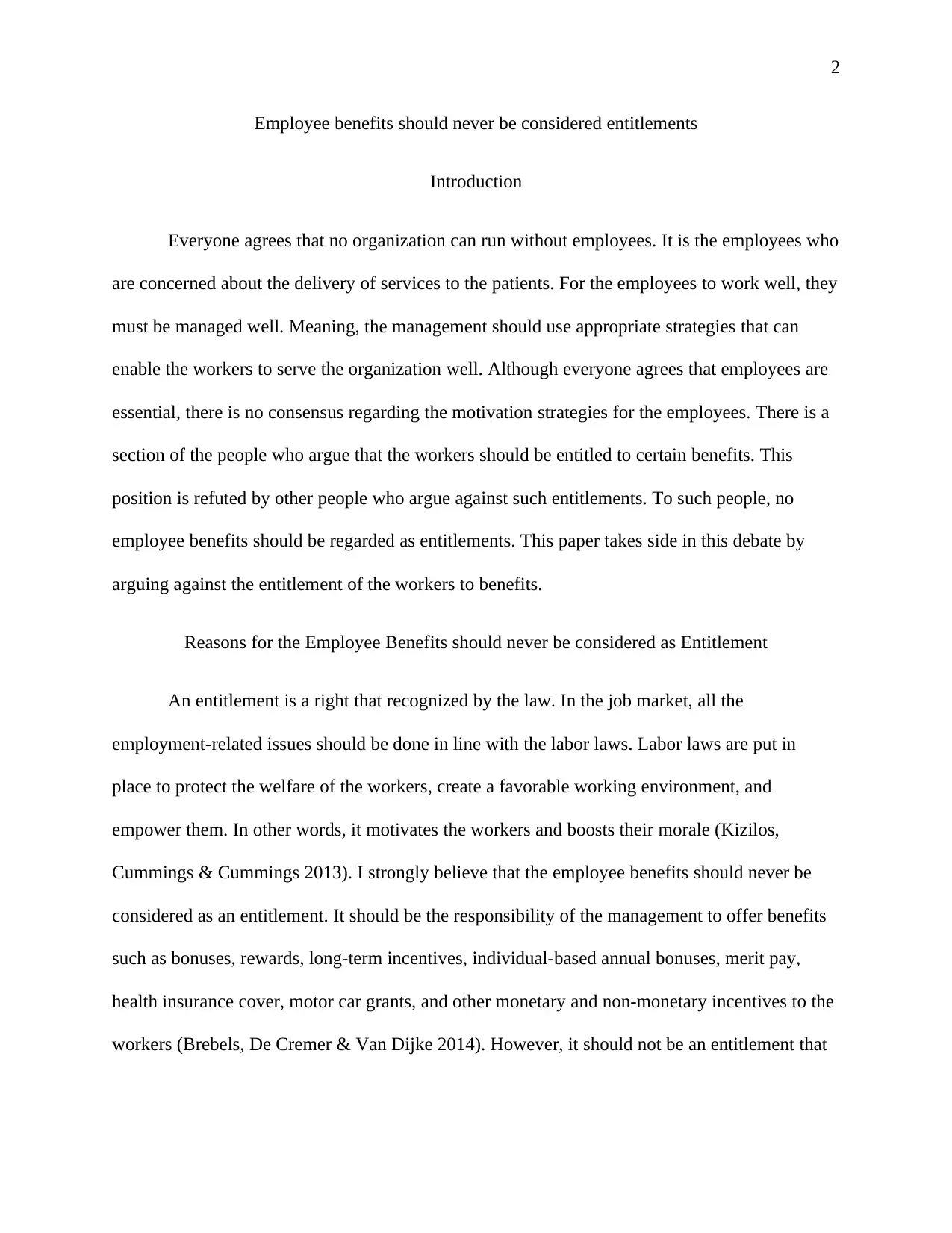
2
Employee benefits should never be considered entitlements
Introduction
Everyone agrees that no organization can run without employees. It is the employees who
are concerned about the delivery of services to the patients. For the employees to work well, they
must be managed well. Meaning, the management should use appropriate strategies that can
enable the workers to serve the organization well. Although everyone agrees that employees are
essential, there is no consensus regarding the motivation strategies for the employees. There is a
section of the people who argue that the workers should be entitled to certain benefits. This
position is refuted by other people who argue against such entitlements. To such people, no
employee benefits should be regarded as entitlements. This paper takes side in this debate by
arguing against the entitlement of the workers to benefits.
Reasons for the Employee Benefits should never be considered as Entitlement
An entitlement is a right that recognized by the law. In the job market, all the
employment-related issues should be done in line with the labor laws. Labor laws are put in
place to protect the welfare of the workers, create a favorable working environment, and
empower them. In other words, it motivates the workers and boosts their morale (Kizilos,
Cummings & Cummings 2013). I strongly believe that the employee benefits should never be
considered as an entitlement. It should be the responsibility of the management to offer benefits
such as bonuses, rewards, long-term incentives, individual-based annual bonuses, merit pay,
health insurance cover, motor car grants, and other monetary and non-monetary incentives to the
workers (Brebels, De Cremer & Van Dijke 2014). However, it should not be an entitlement that
Employee benefits should never be considered entitlements
Introduction
Everyone agrees that no organization can run without employees. It is the employees who
are concerned about the delivery of services to the patients. For the employees to work well, they
must be managed well. Meaning, the management should use appropriate strategies that can
enable the workers to serve the organization well. Although everyone agrees that employees are
essential, there is no consensus regarding the motivation strategies for the employees. There is a
section of the people who argue that the workers should be entitled to certain benefits. This
position is refuted by other people who argue against such entitlements. To such people, no
employee benefits should be regarded as entitlements. This paper takes side in this debate by
arguing against the entitlement of the workers to benefits.
Reasons for the Employee Benefits should never be considered as Entitlement
An entitlement is a right that recognized by the law. In the job market, all the
employment-related issues should be done in line with the labor laws. Labor laws are put in
place to protect the welfare of the workers, create a favorable working environment, and
empower them. In other words, it motivates the workers and boosts their morale (Kizilos,
Cummings & Cummings 2013). I strongly believe that the employee benefits should never be
considered as an entitlement. It should be the responsibility of the management to offer benefits
such as bonuses, rewards, long-term incentives, individual-based annual bonuses, merit pay,
health insurance cover, motor car grants, and other monetary and non-monetary incentives to the
workers (Brebels, De Cremer & Van Dijke 2014). However, it should not be an entitlement that
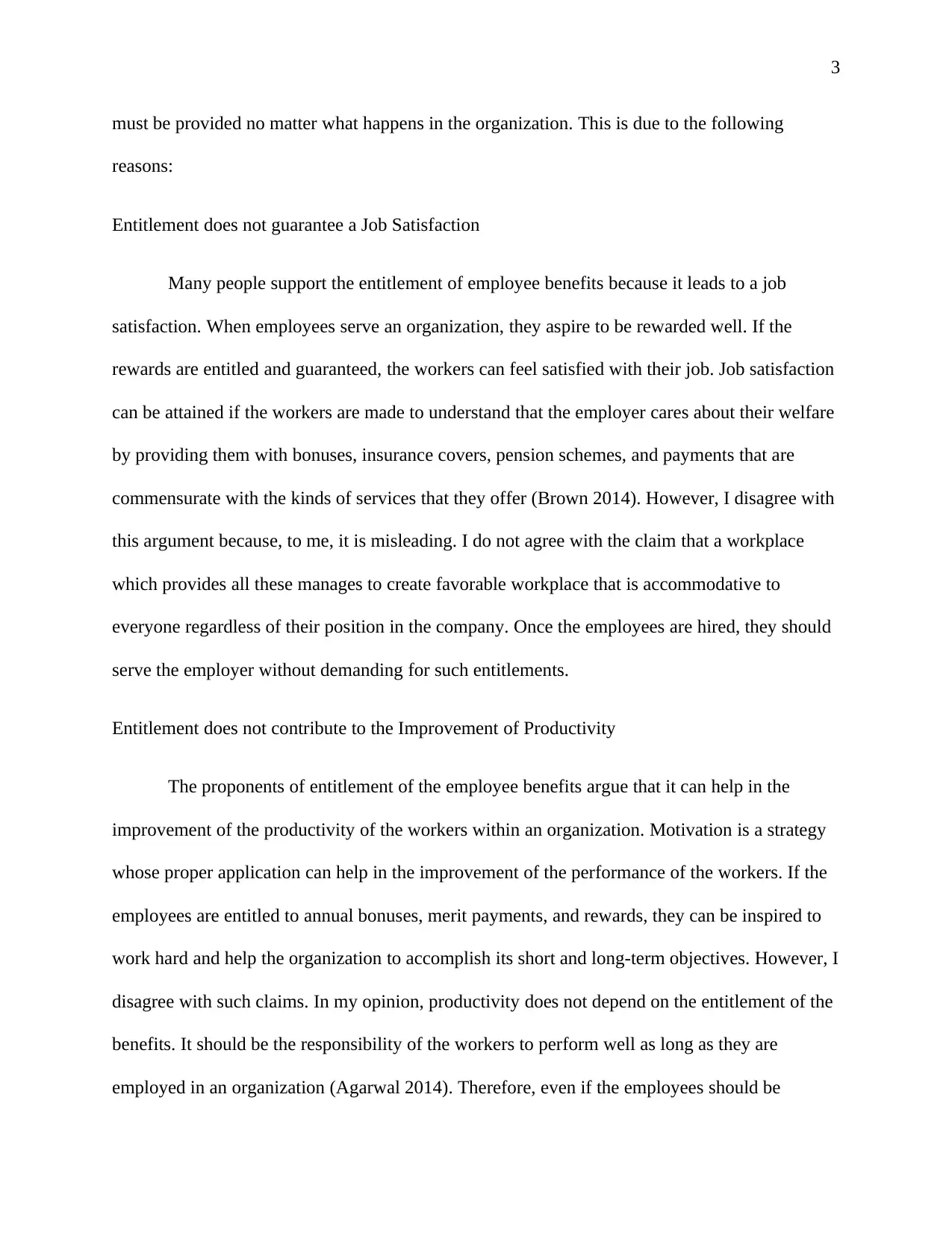
3
must be provided no matter what happens in the organization. This is due to the following
reasons:
Entitlement does not guarantee a Job Satisfaction
Many people support the entitlement of employee benefits because it leads to a job
satisfaction. When employees serve an organization, they aspire to be rewarded well. If the
rewards are entitled and guaranteed, the workers can feel satisfied with their job. Job satisfaction
can be attained if the workers are made to understand that the employer cares about their welfare
by providing them with bonuses, insurance covers, pension schemes, and payments that are
commensurate with the kinds of services that they offer (Brown 2014). However, I disagree with
this argument because, to me, it is misleading. I do not agree with the claim that a workplace
which provides all these manages to create favorable workplace that is accommodative to
everyone regardless of their position in the company. Once the employees are hired, they should
serve the employer without demanding for such entitlements.
Entitlement does not contribute to the Improvement of Productivity
The proponents of entitlement of the employee benefits argue that it can help in the
improvement of the productivity of the workers within an organization. Motivation is a strategy
whose proper application can help in the improvement of the performance of the workers. If the
employees are entitled to annual bonuses, merit payments, and rewards, they can be inspired to
work hard and help the organization to accomplish its short and long-term objectives. However, I
disagree with such claims. In my opinion, productivity does not depend on the entitlement of the
benefits. It should be the responsibility of the workers to perform well as long as they are
employed in an organization (Agarwal 2014). Therefore, even if the employees should be
must be provided no matter what happens in the organization. This is due to the following
reasons:
Entitlement does not guarantee a Job Satisfaction
Many people support the entitlement of employee benefits because it leads to a job
satisfaction. When employees serve an organization, they aspire to be rewarded well. If the
rewards are entitled and guaranteed, the workers can feel satisfied with their job. Job satisfaction
can be attained if the workers are made to understand that the employer cares about their welfare
by providing them with bonuses, insurance covers, pension schemes, and payments that are
commensurate with the kinds of services that they offer (Brown 2014). However, I disagree with
this argument because, to me, it is misleading. I do not agree with the claim that a workplace
which provides all these manages to create favorable workplace that is accommodative to
everyone regardless of their position in the company. Once the employees are hired, they should
serve the employer without demanding for such entitlements.
Entitlement does not contribute to the Improvement of Productivity
The proponents of entitlement of the employee benefits argue that it can help in the
improvement of the productivity of the workers within an organization. Motivation is a strategy
whose proper application can help in the improvement of the performance of the workers. If the
employees are entitled to annual bonuses, merit payments, and rewards, they can be inspired to
work hard and help the organization to accomplish its short and long-term objectives. However, I
disagree with such claims. In my opinion, productivity does not depend on the entitlement of the
benefits. It should be the responsibility of the workers to perform well as long as they are
employed in an organization (Agarwal 2014). Therefore, even if the employees should be
⊘ This is a preview!⊘
Do you want full access?
Subscribe today to unlock all pages.

Trusted by 1+ million students worldwide
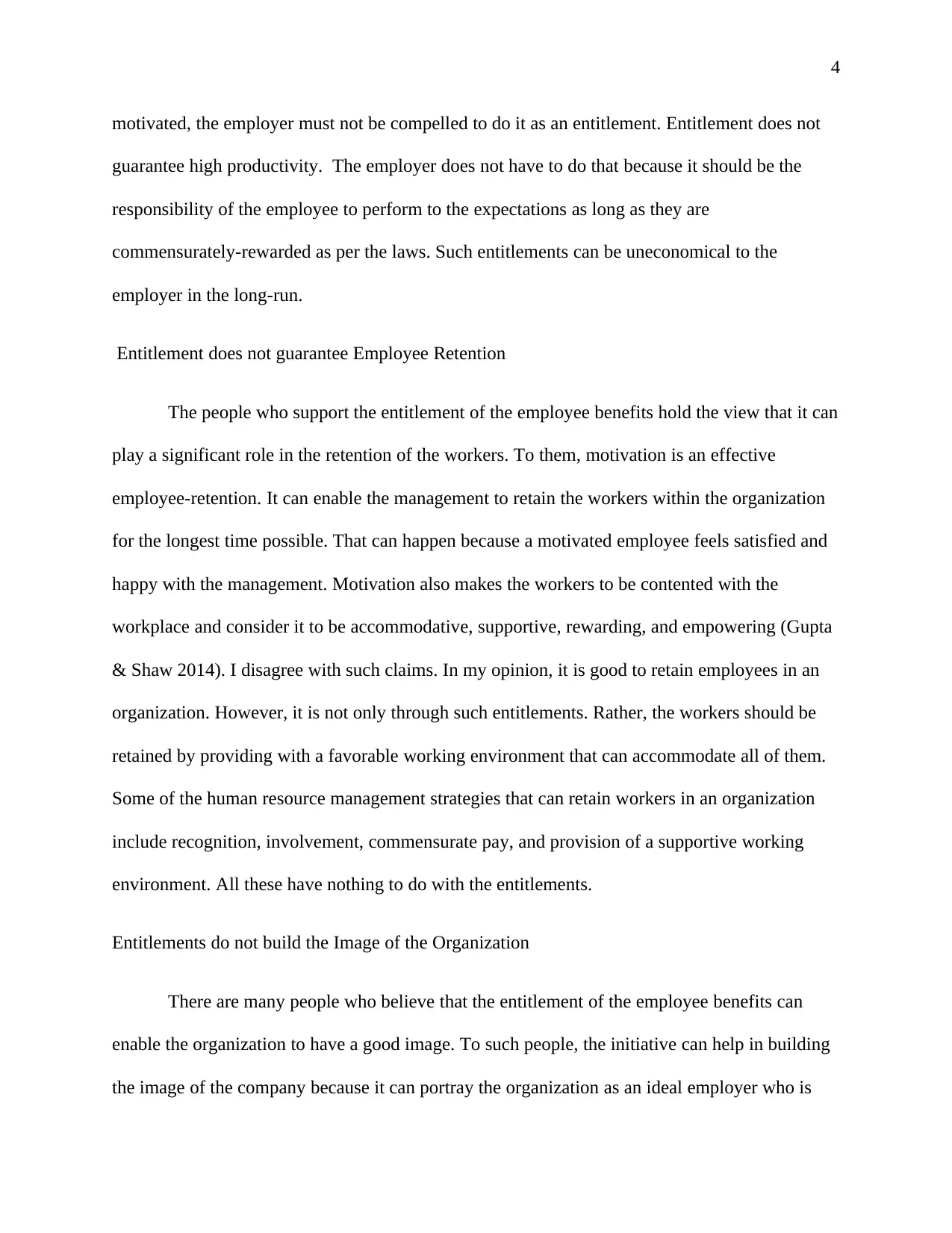
4
motivated, the employer must not be compelled to do it as an entitlement. Entitlement does not
guarantee high productivity. The employer does not have to do that because it should be the
responsibility of the employee to perform to the expectations as long as they are
commensurately-rewarded as per the laws. Such entitlements can be uneconomical to the
employer in the long-run.
Entitlement does not guarantee Employee Retention
The people who support the entitlement of the employee benefits hold the view that it can
play a significant role in the retention of the workers. To them, motivation is an effective
employee-retention. It can enable the management to retain the workers within the organization
for the longest time possible. That can happen because a motivated employee feels satisfied and
happy with the management. Motivation also makes the workers to be contented with the
workplace and consider it to be accommodative, supportive, rewarding, and empowering (Gupta
& Shaw 2014). I disagree with such claims. In my opinion, it is good to retain employees in an
organization. However, it is not only through such entitlements. Rather, the workers should be
retained by providing with a favorable working environment that can accommodate all of them.
Some of the human resource management strategies that can retain workers in an organization
include recognition, involvement, commensurate pay, and provision of a supportive working
environment. All these have nothing to do with the entitlements.
Entitlements do not build the Image of the Organization
There are many people who believe that the entitlement of the employee benefits can
enable the organization to have a good image. To such people, the initiative can help in building
the image of the company because it can portray the organization as an ideal employer who is
motivated, the employer must not be compelled to do it as an entitlement. Entitlement does not
guarantee high productivity. The employer does not have to do that because it should be the
responsibility of the employee to perform to the expectations as long as they are
commensurately-rewarded as per the laws. Such entitlements can be uneconomical to the
employer in the long-run.
Entitlement does not guarantee Employee Retention
The people who support the entitlement of the employee benefits hold the view that it can
play a significant role in the retention of the workers. To them, motivation is an effective
employee-retention. It can enable the management to retain the workers within the organization
for the longest time possible. That can happen because a motivated employee feels satisfied and
happy with the management. Motivation also makes the workers to be contented with the
workplace and consider it to be accommodative, supportive, rewarding, and empowering (Gupta
& Shaw 2014). I disagree with such claims. In my opinion, it is good to retain employees in an
organization. However, it is not only through such entitlements. Rather, the workers should be
retained by providing with a favorable working environment that can accommodate all of them.
Some of the human resource management strategies that can retain workers in an organization
include recognition, involvement, commensurate pay, and provision of a supportive working
environment. All these have nothing to do with the entitlements.
Entitlements do not build the Image of the Organization
There are many people who believe that the entitlement of the employee benefits can
enable the organization to have a good image. To such people, the initiative can help in building
the image of the company because it can portray the organization as an ideal employer who is
Paraphrase This Document
Need a fresh take? Get an instant paraphrase of this document with our AI Paraphraser
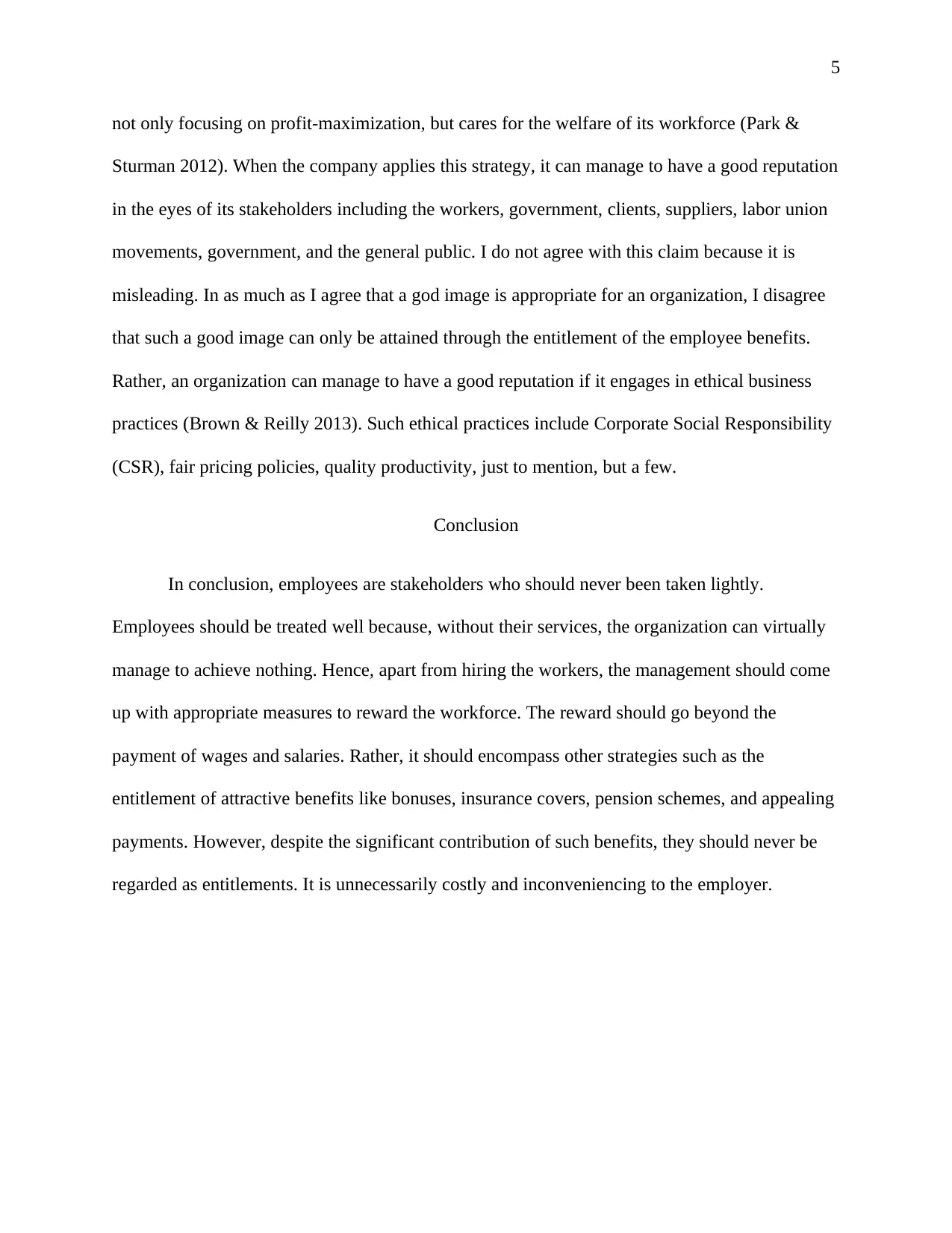
5
not only focusing on profit-maximization, but cares for the welfare of its workforce (Park &
Sturman 2012). When the company applies this strategy, it can manage to have a good reputation
in the eyes of its stakeholders including the workers, government, clients, suppliers, labor union
movements, government, and the general public. I do not agree with this claim because it is
misleading. In as much as I agree that a god image is appropriate for an organization, I disagree
that such a good image can only be attained through the entitlement of the employee benefits.
Rather, an organization can manage to have a good reputation if it engages in ethical business
practices (Brown & Reilly 2013). Such ethical practices include Corporate Social Responsibility
(CSR), fair pricing policies, quality productivity, just to mention, but a few.
Conclusion
In conclusion, employees are stakeholders who should never been taken lightly.
Employees should be treated well because, without their services, the organization can virtually
manage to achieve nothing. Hence, apart from hiring the workers, the management should come
up with appropriate measures to reward the workforce. The reward should go beyond the
payment of wages and salaries. Rather, it should encompass other strategies such as the
entitlement of attractive benefits like bonuses, insurance covers, pension schemes, and appealing
payments. However, despite the significant contribution of such benefits, they should never be
regarded as entitlements. It is unnecessarily costly and inconveniencing to the employer.
not only focusing on profit-maximization, but cares for the welfare of its workforce (Park &
Sturman 2012). When the company applies this strategy, it can manage to have a good reputation
in the eyes of its stakeholders including the workers, government, clients, suppliers, labor union
movements, government, and the general public. I do not agree with this claim because it is
misleading. In as much as I agree that a god image is appropriate for an organization, I disagree
that such a good image can only be attained through the entitlement of the employee benefits.
Rather, an organization can manage to have a good reputation if it engages in ethical business
practices (Brown & Reilly 2013). Such ethical practices include Corporate Social Responsibility
(CSR), fair pricing policies, quality productivity, just to mention, but a few.
Conclusion
In conclusion, employees are stakeholders who should never been taken lightly.
Employees should be treated well because, without their services, the organization can virtually
manage to achieve nothing. Hence, apart from hiring the workers, the management should come
up with appropriate measures to reward the workforce. The reward should go beyond the
payment of wages and salaries. Rather, it should encompass other strategies such as the
entitlement of attractive benefits like bonuses, insurance covers, pension schemes, and appealing
payments. However, despite the significant contribution of such benefits, they should never be
regarded as entitlements. It is unnecessarily costly and inconveniencing to the employer.
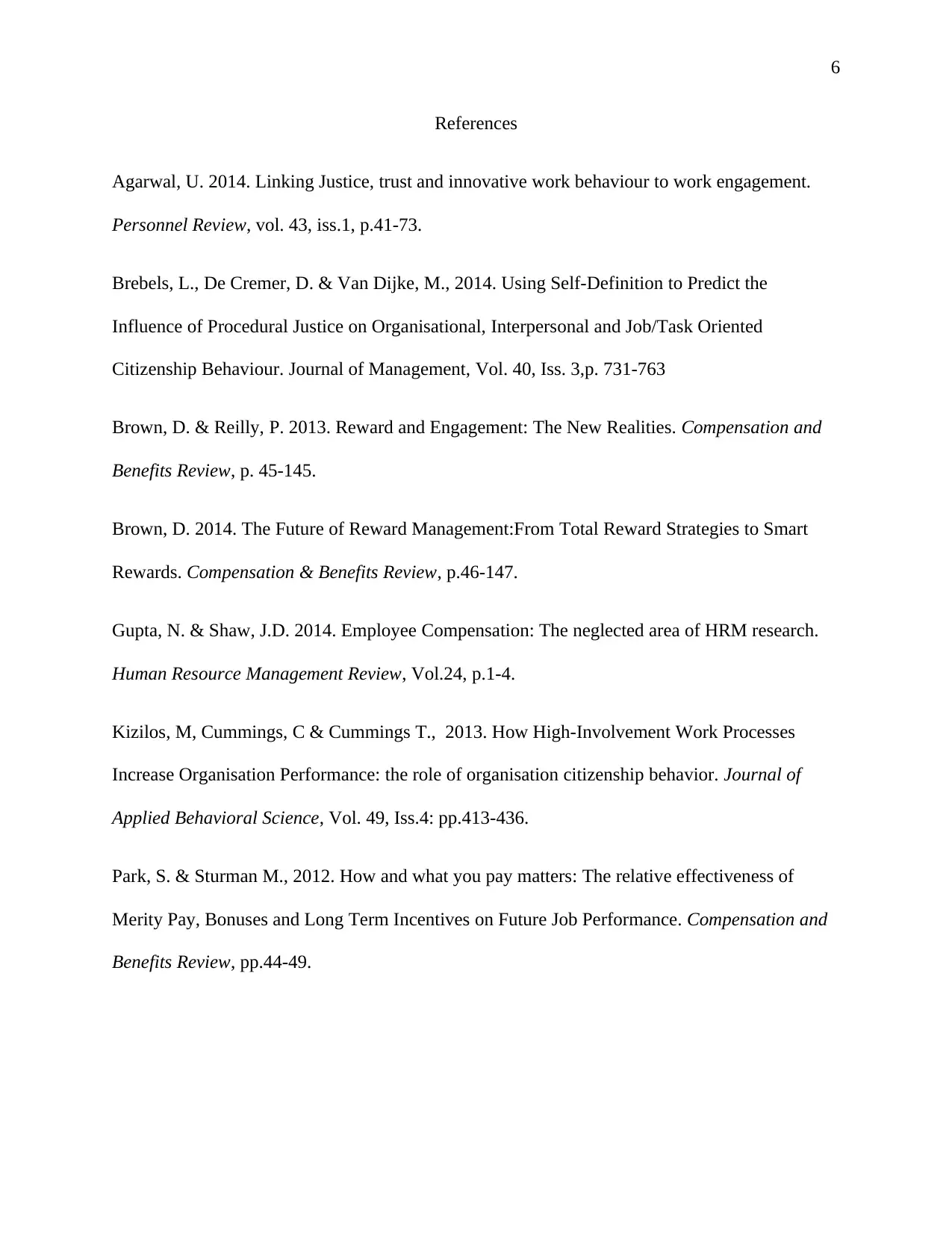
6
References
Agarwal, U. 2014. Linking Justice, trust and innovative work behaviour to work engagement.
Personnel Review, vol. 43, iss.1, p.41-73.
Brebels, L., De Cremer, D. & Van Dijke, M., 2014. Using Self-Definition to Predict the
Influence of Procedural Justice on Organisational, Interpersonal and Job/Task Oriented
Citizenship Behaviour. Journal of Management, Vol. 40, Iss. 3,p. 731-763
Brown, D. & Reilly, P. 2013. Reward and Engagement: The New Realities. Compensation and
Benefits Review, p. 45-145.
Brown, D. 2014. The Future of Reward Management:From Total Reward Strategies to Smart
Rewards. Compensation & Benefits Review, p.46-147.
Gupta, N. & Shaw, J.D. 2014. Employee Compensation: The neglected area of HRM research.
Human Resource Management Review, Vol.24, p.1-4.
Kizilos, M, Cummings, C & Cummings T., 2013. How High-Involvement Work Processes
Increase Organisation Performance: the role of organisation citizenship behavior. Journal of
Applied Behavioral Science, Vol. 49, Iss.4: pp.413-436.
Park, S. & Sturman M., 2012. How and what you pay matters: The relative effectiveness of
Merity Pay, Bonuses and Long Term Incentives on Future Job Performance. Compensation and
Benefits Review, pp.44-49.
References
Agarwal, U. 2014. Linking Justice, trust and innovative work behaviour to work engagement.
Personnel Review, vol. 43, iss.1, p.41-73.
Brebels, L., De Cremer, D. & Van Dijke, M., 2014. Using Self-Definition to Predict the
Influence of Procedural Justice on Organisational, Interpersonal and Job/Task Oriented
Citizenship Behaviour. Journal of Management, Vol. 40, Iss. 3,p. 731-763
Brown, D. & Reilly, P. 2013. Reward and Engagement: The New Realities. Compensation and
Benefits Review, p. 45-145.
Brown, D. 2014. The Future of Reward Management:From Total Reward Strategies to Smart
Rewards. Compensation & Benefits Review, p.46-147.
Gupta, N. & Shaw, J.D. 2014. Employee Compensation: The neglected area of HRM research.
Human Resource Management Review, Vol.24, p.1-4.
Kizilos, M, Cummings, C & Cummings T., 2013. How High-Involvement Work Processes
Increase Organisation Performance: the role of organisation citizenship behavior. Journal of
Applied Behavioral Science, Vol. 49, Iss.4: pp.413-436.
Park, S. & Sturman M., 2012. How and what you pay matters: The relative effectiveness of
Merity Pay, Bonuses and Long Term Incentives on Future Job Performance. Compensation and
Benefits Review, pp.44-49.
⊘ This is a preview!⊘
Do you want full access?
Subscribe today to unlock all pages.

Trusted by 1+ million students worldwide
1 out of 6
Related Documents
Your All-in-One AI-Powered Toolkit for Academic Success.
+13062052269
info@desklib.com
Available 24*7 on WhatsApp / Email
![[object Object]](/_next/static/media/star-bottom.7253800d.svg)
Unlock your academic potential
Copyright © 2020–2026 A2Z Services. All Rights Reserved. Developed and managed by ZUCOL.





